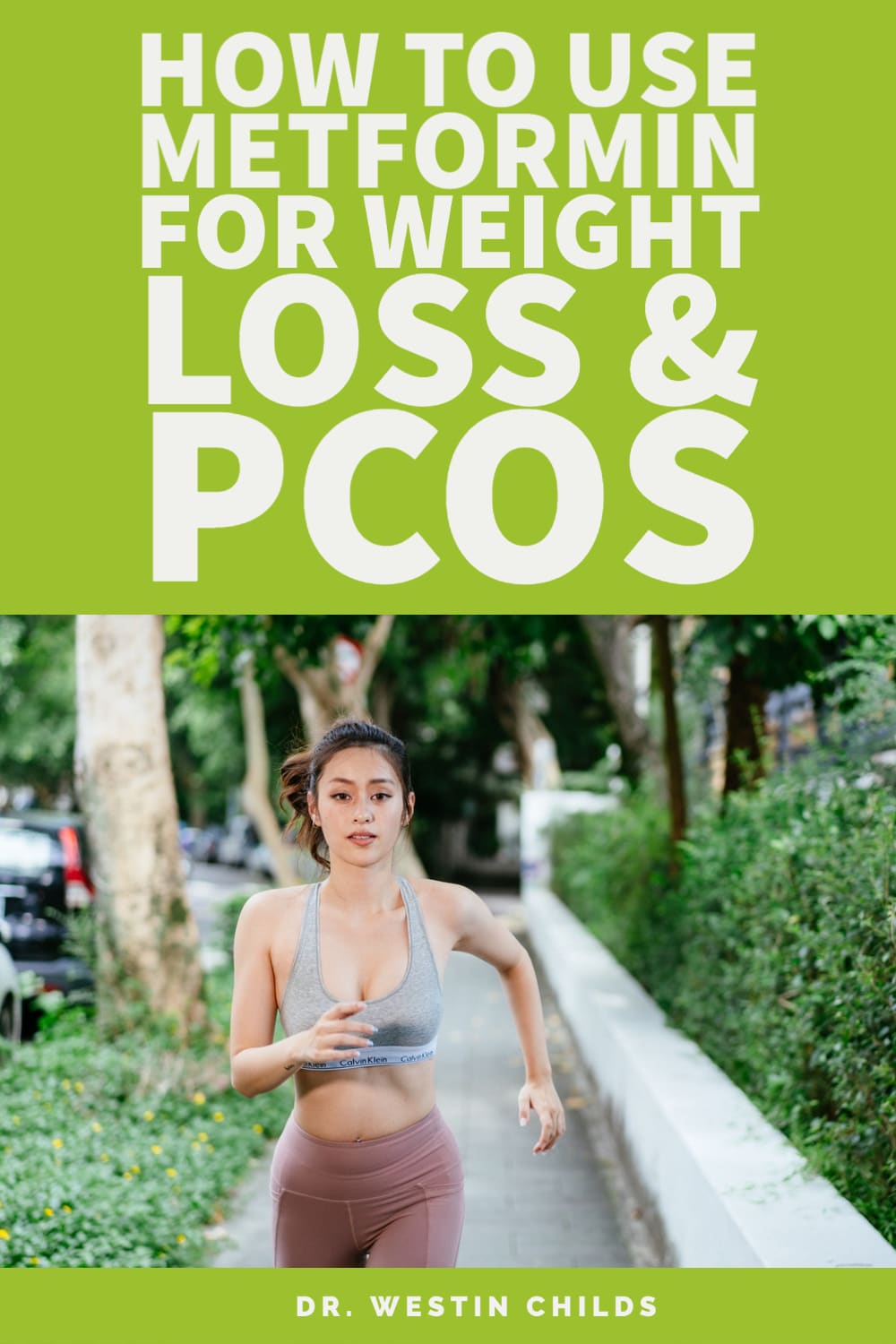Did you know that one of the main reasons you can’t lose weight with PCOS is because of your hormones?
It’s true, and that’s why many women (and physicians) turn to Metformin to try and help with weight loss.
But just because it works for some people doesn’t mean it will necessarily work for YOU.
Find out why metformin helps with weight loss, but more importantly what works better and how to finally lose weight if you have PCOS.
Insulin & PCOS: Why It’s so Important
One of the most common medications prescribed for PCOS is metformin.
But, PCOS is a hormonal condition that results in weight gain, hair growth on the face, infertility, acne, and estrogen/progesterone imbalances.
So why is metformin, a medication used to lower blood sugar and treat insulin resistance, used to treat estrogen/progesterone imbalances in women?
The logic is quite simple:
Most of the symptoms of PCOS (all those listed above) stem from insulin resistance (1)!
In fact, many physicians recommend that ALL women with PCOS should be treated for insulin resistance regardless of what their fasting insulin and fasting blood sugar levels are.
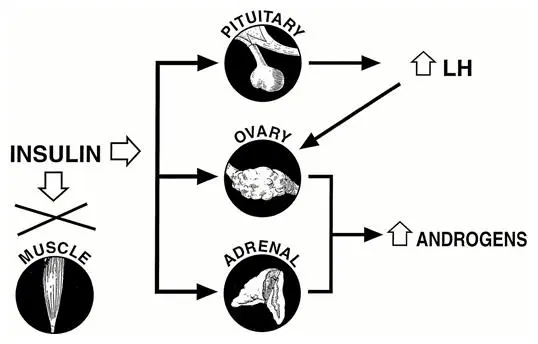
This means that the root cause of PCOS (at least the majority of it) is insulin resistance, and this is why metformin is so commonly used to treat it.
Insulin resistance causes a block of glucose uptake in your skeletal muscles which results in a lower metabolism (and weight gain), insulin also directly acts on your ovaries and adrenals increasing androgens like testosterone and DHEA.
It’s also the action of insulin on your pituitary that results in increased LH production which over-stimulates your ovaries resulting in the characteristic “cysts” of PCOS.
High levels of DHEA and testosterone lead to acne and hair growth (hirsutism).
But one simple question remains:
Does metformin actually work and does it cause weight loss?
The truth is that while insulin resistance is the underlying cause of PCOS, there are much better ways to treat this problem and it turns out that metformin is NOT the best medication to reduce blood sugar OR help with weight loss.
Despite this, it still has some uses and we will talk about those.
But first…
Does Metformin Help with Weight Loss?
So our main concern is whether or not metformin actually helps women with PCOS lose weight.
The truth is that it CAN result in weight loss, but in most patients, it WON’T result in weight loss.
First, let’s talk about how it CAN cause weight loss.
Metformin is a biguanide medication that acts through a number of mechanisms, but the most important one is the sensitization of your cells to insulin.
That means that metformin actually makes your body more SENSITIVE to the insulin that is already in circulation – and this is a good thing, we want this to happen.
Insulin is a hormone that is secreted from your body and it’s designed to help your body store glucose or blood sugar.
It does this by forcing any excess blood sugar straight into your fat cells.
This is a good thing in small amounts, but once you develop insulin resistance it becomes a big problem.
Basically what happens is your body pumps out insulin at higher levels than normal and insulin stays around longer than it should in your blood.
So the next time you have a meal, instead of that glucose being used as an energy source for your muscles, brain tissue, heart tissue, etc. it’s instead stuffed right into your fat cells – making you gain weight.
This mechanism is exactly why it’s so difficult for PCOS patients to lose weight.
This is also why low-calorie diets won’t work in the presence of insulin resistance, it doesn’t matter if you eat 1,000 calories if your insulin levels are high.
And this is also why metformin CAN help certain people with weight loss (even without changing their diet).
Studies have shown (2) that some patients with PCOS taking metformin (at various doses) may lose up to 4% of their body fat over an 8-month period:
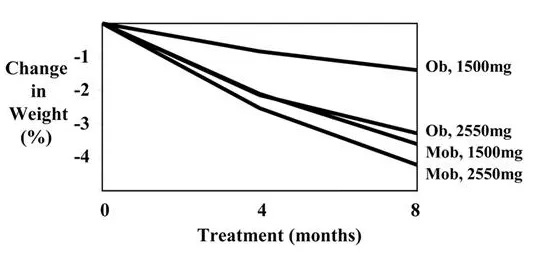
This graph outlines the various dosages of metformin and how certain patients lost weight.
You can see from this study the direct correlation between metformin dosing and weight loss over time.
Patients on 2500mg of metformin lost about twice as much weight as patients only taking 1,500mg of metformin over the same period of time.
This information is helpful because it does indeed prove that treating insulin resistance in patients with PCOS does result in weight loss, and it seems that this weight loss is dose-dependent.
After reading this you might ask this question:
I have PCOS and I’m taking metformin but I’m not losing weight, how come?
Well, it could be due to several reasons:
#1. It may be due to your dose being too low.
As you can see from the study above the dosages were quite high (up to 2,500mg per day) and most Doctors start patients on doses as low as 500mg per day and may never increase it from there.
The second (and more common option) is that your insulin resistance is TOO far progressed to be treated by metformin.
You see:
Metformin is a good medication, but it is weaker when compared to newer medications and therefore not quite as good.
If you consider that your dose matters quite a bit in terms of how much weight patients lose, then you can easily understand that more efficacious medications are likely to result in even more weight loss than metformin.
And this helps us understand why certain patients with PCOS will tell you that metformin was life-changing for them while other patients insist that metformin is useless for them.

PCOS, like other hormone imbalances, is on a spectrum.
That means no two cases are going to be alike, and no two cases will need the same treatment.
You MUST individualize your treatment!
Having said all of this, I still want to make the case for using metformin even if you decide you may need a stronger and better alternative.
Why?
Because metformin can be COMBINED with other medications to produce even BETTER results.
In addition, metformin also has several other benefits that can help patients with PCOS.
You can see the full list below…
Benefits of Metformin:
- Reduces inflammation (3)
- Reduces insulin resistance and lowers blood sugar
- Reduces oxidative stress (4)
- Improves blood flow and endothelial function (5)
- Helps with weight loss in some patients
- Improves cholesterol and lipid profile (6)
So even if metformin doesn’t help you with weight loss it doesn’t mean you should necessarily stop taking it, especially since it may be helping in other ways.
One of the more important pathways is the inflammatory cascade:
Metformin helps reduce inflammation, and the presence of inflammation is what triggers many of the negative downstream consequences of PCOS.
Thyroid dysfunction, leptin resistance, and autoimmune disease can stem from untreated inflammation:
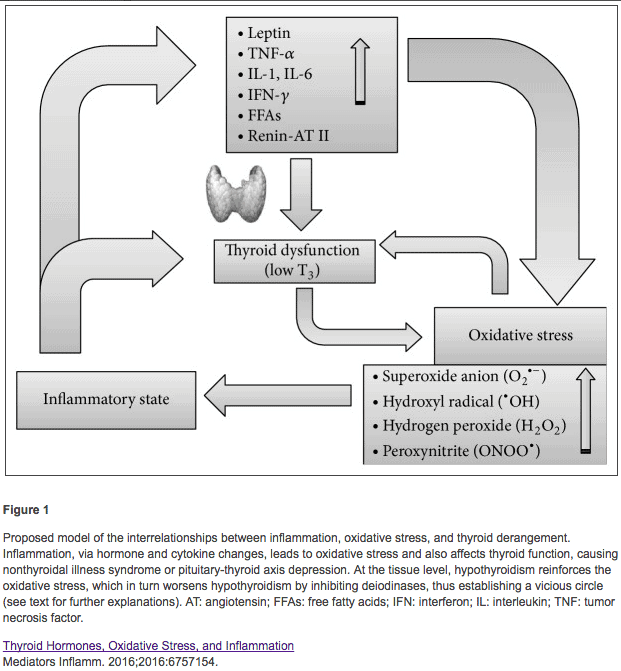
The connection between thyroid disease and PCOS is very important because hypothyroidism makes all of the symptoms of PCOS worse and there is an emerging relationship between these two conditions in the literature (7).
Better Options…
So what can you take or what can you do if metformin isn’t working for you?
There happen to be some very helpful and newer medications that have come out recently that show special promise in treating patients with PCOS.
I can vouch for the efficacy of these medications and I use them on my PCOS spectrum patients with great results.
I can tell you from first-hand experience that these medications are far more powerful than metformin at reducing insulin levels AND helping with weight loss.
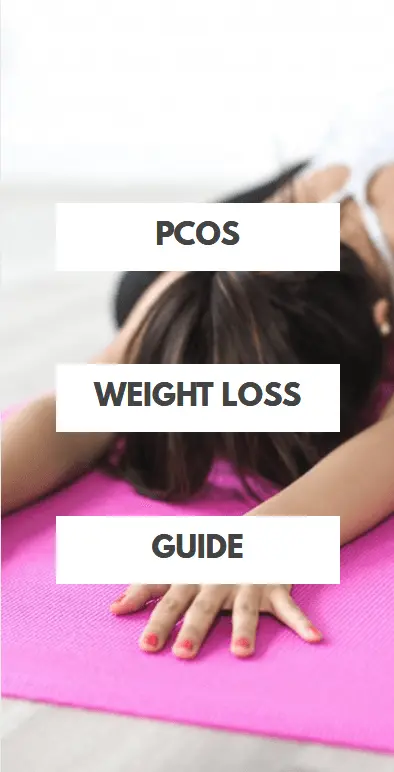
They also can help improve and reduce androgen levels (DHEA and testosterone levels).
It’s important to realize that these medications are usually used off-label for PCOS.
The reason is that they are FDA-approved for treating type II diabetes, not necessarily for treating PCOS.
But if you understand the pathology and etiology of PCOS then you understand exactly why these medications are so helpful.
Because they are FDA-approved for type II diabetes many physicians may not be aware of how helpful they can be, which means it’s up to you to look into them and be your own advocate.
GLP-1 Agonists
First on the list is the GLP-1 agonists.
I haven’t been shy about why I like this class of medications.
Why?
Because they work so well and represent an accidental discovery of why exactly so many patients gain weight and have weight loss resistance: the combination of hyperglucagonemia and hyperleptinemia.
These medications were designed to treat blood sugar issues but they help in so many other ways.
But the relevant topic here is weight loss.
So do GLP-1 agonists help with weight loss?
Yes, and the studies confirm this (8):
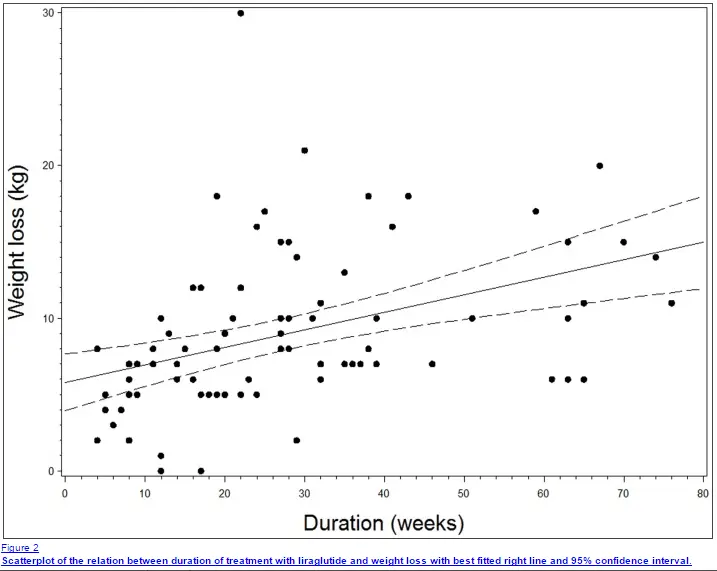
Studies have shown that the longer you take this medication the more weight loss you have, up to as much as 20 kgs (40+ pounds).
If you’ve read my case studies you know that this is actually true and I’ve shown it previously.
But things get even more interesting the deeper you dig:
Take for example this study (9).
It showed that patients taking metformin did experience some weight loss (around 1-2 pounds which I find to be accurate nowadays).
It compared a GLP-1 agonist by itself to the combination of metformin plus the GLP-1 agonist which resulted in significant weight loss over either medication alone.

What’s even more interesting is that this weight loss occurred in patients who had previously FAILED metformin monotherapy (10).
This means they took patients who previously took metformin but didn’t lose ANY weight, and they put these patients on the combination of metformin plus GLP-1 agonist and they did, in fact, lose weight.
This is important because patients who don’t lose weight on metformin are considered to be more resistant than others (and therefore more difficult to treat).
Chances are high that if you are reading this article you are likely also difficult to treat – otherwise, you wouldn’t have a need to look for an alternative!
Outside of the positive benefits that these medications have on weight loss they also have many other benefits.
Other benefits of GLP-1 agonists:
- Lowers and treats leptin resistance
- Treats glucagon-related issues
- Lowers androgen levels
- Dramatically helps with weight loss
- Helps improve metabolism over time
- Greatly reduces insulin and blood sugar levels
One of the reasons these medications are so helpful likely has to do with how GLP-1 agonists benefit other hormones in your body.
One final note:
In order to get the kind of results I am talking about here you have to make sure you are using the right type of GLP-1 agonist and at the right dose.
Most physicians don’t know how to dose, titrate, or use these medications for PCOS.
You can find more information about how I use these medications, how to titrate your dosing, and how to adjust dosing for the most benefit in my weight loss and hormone mastery guide.
Supplements to reduce Insulin Resistance
To get the best results and the most weight loss, you will need to use a combination of therapies.
What does this mean for you?
You shouldn’t expect significant weight loss by simply taking medication.
If you are serious about getting results then you will need to use a combination of supplements, medications (combinations of medications), and dietary changes.
Simply taking medication will NEVER result in reversal or even dramatic improvement in your PCOS symptoms.
Here we will discuss relevant supplements that can actually dramatically reduce insulin resistance and can safely be used with metformin (or GLP-1 agonists).
I’ve written about other supplements that can help PCOS patients here.
Supplements that help lower insulin levels in patients with PCOS:
- Alpha lipoic acid: ALA helps sensitize your body to insulin and can help lower blood sugar levels. If you have PCOS you will want to use up to 2,400mg per day in a sustained release form for best results. The length of treatment time should be around 6 months. You can read more about how ALA helps with weight loss here.
- Berberine: Berberine has been shown to reduce hemoglobin A1c as much as metformin (which means it’s very effective) and has also been shown to help with weight loss in patients with insulin resistance. Use up to 2,000mg per day for best results and for at least 4 months. Read more about how to use berberine for weight loss here.
- Glucomannan: This viscous fiber helps reduce the absorption of carbohydrates into the bloodstream, helps reduce your appetite, and reduces spikes in insulin levels. Use 4 tablets 15 minutes before a meal with a large glass of water for best results (use 3-4x per day).
- Fish Oil: Fish oil can lower insulin resistance by lowering inflammation and directly lead to weight loss and an increase in lean muscle mass if used at high enough dosages. You will want to use 2-4 GRAMS per day to get this benefit, which means 2,000 to 4,000mg of high-quality fish oil per day (more info below).
Part of the reason that patients don’t get results is that they don’t use high-quality supplements and they don’t use a high enough dose.
If you are serious about results then you need to use these supplements as indicated above.
Also, because inflammation plays a special role in PCOS I’ve also gone into more detail regarding fish oil.
Why?
Because fish oil has been shown to reduce inflammation, directly reduce fat mass, and build up lean muscle mass.
Diets to help reduce Insulin Resistance
Beyond taking supplements and medications you can and should also be trying to change your diet.
That means taking an active approach and consciously changing your diet to exclude the types of foods that spike insulin and make PCOS worse.
The type of diet you choose is less important than you think as long as you stick to some basic categories.
First: You should avoid all sugar.
Second: You should avoid all processed foods.
Third: You should eat organic and grass-fed whenever possible (as someone with PCOS you want to avoid any excess artificial growth hormones)
Fourth: You should tailor the number of carbohydrates and protein you eat to your body type and your leptin/insulin levels.
As long as you stick within these basic rules you can manipulate any base diet to meet your needs.
To give you a good starting point you can try any of these diets:
- Paleo diet
- Autoimmune Paleo diet (helpful if you have Hashimoto’s or other Autoimmune diseases)
- Ketogenic diet
- Whole 30
You will want to start with one diet and then adjust how much, how often, and your macromolecule ratios based on your specific needs.
Again, you can find more information on how to do this in my hormone mastery guide.
Wrapping it up
The bottom line:
Metformin can help patients with PCOS lose weight, but it’s not the best nor most effective medication.
If you are serious about treating your PCOS symptoms you need to put the majority of your focus on insulin resistance.
And that means a combination of taking the right type and dose of medication, changing your diet, and taking the right type and dose of supplements.
By doing these things it will be possible for you to lose weight and start feeling better.
Now I want to hear from you:
Do you have PCOS?
Have you taken metformin?
Has it worked for you? Why or why not?
Leave your comments below!
Scientific References
#1. https://www.ncbi.nlm.nih.gov/pmc/articles/PMC3277302/
#2. https://www.ncbi.nlm.nih.gov/pubmed/15886247
#3. https://www.ncbi.nlm.nih.gov/pmc/articles/PMC3607889/
#4. https://www.ncbi.nlm.nih.gov/pubmed/21146883
#5. https://www.ncbi.nlm.nih.gov/pubmed/23981104
#6. https://www.ncbi.nlm.nih.gov/pubmed/2291838
#7. https://www.ncbi.nlm.nih.gov/pmc/articles/PMC3832324/
#8. https://www.ncbi.nlm.nih.gov/pubmed/25885106
#9. https://www.ncbi.nlm.nih.gov/pmc/articles/PMC4145240/
#10. https://www.ncbi.nlm.nih.gov/pmc/articles/PMC3922503/
